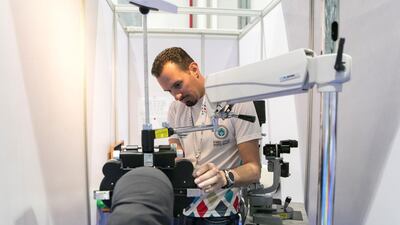People with intellectual disabilities must be provided for by national health infrastructure, members of the Special Olympics Healthy Athlete programme have highlighted.
In the MENA region, “health services need to be available ... because what we have found is that people with intellectual disabilities, many times, they have been excluded from national services,” said Javier Vasquez, senior director of the Special Olympics Global Health Programs.
“We are taking advantage of 20 years of Healthy Athletes, where we have collected significant information about the health problems of people with intellectual disabilities in eight different disciplines, and now we are making the case before international organisations, such as the World Health Organisation ... that people with intellectual disabilities have to be visible in their health information systems,” he said.
The Healthy Athletes programme offers free health screenings to athletes at the Special Olympic Games. The committee is teaming up with UAE health authorities to ensure that appropriate services are provided to people with intellectual disabilities.
Almost all the athletes they see have oral health problems, and a majority have vision and hearing problems. Officials are concerned over the fate of many athletes after they return to their home countries.
Doctors carrying out screenings this year detected a previously unknown issue with an Egyptian athlete’s sight. The girl, who was suffering from a build-up of pressure behind her eyes, was at risk of losing her vision if the problem was not treated.
Among Special Olympics athletes seen in the MENA Region, 23 per cent present with mouth pain, 62 per cent have untreated tooth decay, 36 per cent are missing teeth, 63 per cent have signs of gingivitis and 25 per cent need urgent attention from a dentist.
______________
Read more:
How the Special Olympics Healthy Athletes programme was inspired by the 'forgotten' Kennedy
The Special Olympics are testament to the UAE's inclusivity for people like me
UAE sprinters challenge perception that Arabs don’t play sport
______________
Additionally, 38 per cent of Special Olympics athletes in the MENA Region have never had an eye exam, 9 per cent have permanent hearing loss and 75 per cent have balance problems.
Dainius Puras, United Nations Special Rapporteur on the right of everyone to the enjoyment of the highest attainable standard of physical and mental health, said that by law in most countries people with disabilities have the right to health services and are not discriminated against, but that is not the reality.
An issue of great concern, he said, is the lowered life expectancy of those with intellectual disabilities, but the Special Olympics is a great “path” to helping people.
Medical professionals carried out almost 3,000 screenings for a range of health conditions as part of the Healthy Athletes programme at the Abu Dhabi Games this week. A total of 913 were treated for dental, vision and podiatry-related issues.
Mr Vasquez said: "Some athletes in these clinics at the Healthy Athlete programme have access to care that would not be available for them in their own countries. That should not be the case. We aren’t a health authority, but we have to do it."

